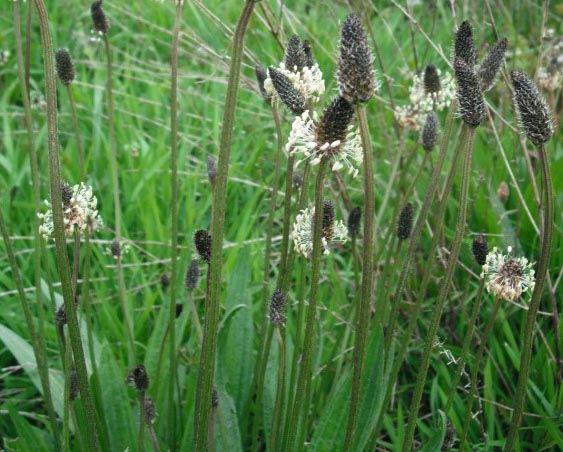Plantagoside and Narcissoside from Plantago lanceolata can inhibit Monkeypox (Mpox) virus's Profilin-like protein A42R
Nikhil Prasad Fact checked by:Thailand Medical News Team Sep 11, 2024 7 months, 1 week, 2 days, 12 hours, 55 minutes ago
Herbs And Phytochemicals: Potential Antiviral Plant Compounds Show Promise Against Monkeypox Virus
Recent scientific discoveries have opened new avenues in the fight against the monkeypox virus (MPXV). Researchers from King Abdulaziz University in Saudi Arabia and Quanta Calculus in India have identified potential antiviral compounds from a medicinal plant, Plantago lanceolata, that may help in inhibiting the monkeypox virus. This
Herbs And Phytochemicals news report delves into the findings of their study and explores how these compounds could contribute to new treatments.
 Phytochemicals Plantagoside and Narcissoside from Plantago lanceolata can inhibit Monkeypox
Phytochemicals Plantagoside and Narcissoside from Plantago lanceolata can inhibit Monkeypox
(Mpox) virus's Profilin-like protein A42R
Understanding Monkeypox and the Need for New Treatments
Monkeypox, once limited to parts of Africa, has recently spread to many other regions globally, causing health concerns in countries where it was not previously endemic. MPXV belongs to the genus Orthopoxvirus in the Poxviridae family, a group that also includes the variola virus (which causes smallpox). Despite existing treatments such as the smallpox vaccine and antivirals like Tecovirimat, there remains an urgent need for more targeted and effective therapies, especially with the increase in global cases.
The study has identified natural antiviral compounds that target the profilin-like A42R protein of the monkeypox virus. The study, led by Leena H. Bajrai, Azzah S. Alharbi, Mai M. El-Day, Abrar G. Bafaraj, Vivek Dhar Dwivedi, and Esam I. Azhar, involved the computational screening of 65 compounds from Plantago lanceolata to determine their efficacy against the A42R protein.
The Key Findings: Antiviral Potential in Plantago Lanceolata
Plantago lanceolata is a medicinal plant known for its various therapeutic properties, including antimicrobial and antiviral activities. Researchers sought to identify compounds within this plant that could potentially bind to and inhibit the monkeypox virus's A42R protein, which plays a role in the virus's replication and interaction with host cells. Using a structure-based computational approach, the team identified five top compounds with strong binding affinities:
-Luteolin 7,3′-Diglucuronide
-Luteolin 7-Glucuronide-3′-Glucoside
-Plantagoside
-Narcissoside
-(AlphaE,8S,9R)-N-(3,4-Dihydroxyphenethyl)-8-[(3,4-Dihydroxyphenethyl)Carbamoyl]-9-(1,3-Benzodioxole-5-Yl)-3aalpha,7aalpha-Ethano-1,3-Benzodioxole-5-Acrylamide
These compounds exhibited strong interactions with the A42R protein, suggesting they could inhibit the monkeypox virus from replicating in human cells. In particular,
Plantagoside and
Narcissoside were highlighted for their stability and efficacy during molecular dynamics simulations, suggesting they may be the most promising candidates for further investigation.
How the Com
pounds Work: Targeting A42R Protein
The A42R protein in the monkeypox virus has similarities to eukaryotic profilins, proteins involved in the regulation of the cytoskeleton within cells. The researchers found that the identified compounds bind to specific sites on the A42R protein, preventing it from interacting with its natural substrates, which are essential for the virus's survival and replication.
By interfering with this protein, the compounds effectively inhibit the replication process of the virus, making it more difficult for the virus to multiply and spread. This is particularly significant because current treatments for monkeypox are limited, and these plant-derived compounds could offer a new approach to managing the infection.
Molecular Docking and Dynamic Simulations
To further verify the efficacy of these compounds, the researchers conducted molecular docking and re-docking studies, followed by molecular dynamics (MD) simulations. Docking simulations help visualize how well a compound binds to a target protein, while MD simulations assess the stability of the compound-protein interaction over time.
The results showed that all five compounds had strong binding affinities with the A42R protein, with binding energies lower than -9.0 kcal/mol, indicating that they were highly stable in their interactions. The MD simulations, which lasted for 100 nanoseconds, revealed that Plantagoside and Narcissoside maintained their stability in the protein's binding pocket, further supporting their potential as antiviral agents.
The Importance of Stability and Binding Energy
The ability of a compound to remain stable when bound to a target protein is critical in determining its potential as a drug candidate. In this study, Plantagoside and Narcissoside demonstrated strong hydrogen bond interactions with key amino acids in the A42R protein, such as ARG114, ARG115, and ARG119. These bonds are important because they anchor the compound in place, ensuring it can continue to inhibit the virus over time.
Additionally, the compounds exhibited hydrophobic interactions and water bridges that further contributed to their binding stability. These findings suggest that both Plantagoside and Narcissoside could be developed into potent antiviral drugs, either on their own or in combination with existing treatments.
Why This Research Matters
The ongoing monkeypox outbreaks around the world have highlighted the need for new and effective treatments, especially as the virus continues to evolve. The compounds identified in this study provide hope for the development of natural, plant-based therapies that could offer a new line of defense against the virus. Furthermore, the use of computational methods in drug discovery has accelerated the process of identifying potential candidates, allowing researchers to focus on the most promising compounds for further investigation.
Conclusion: The Future of Monkeypox Treatment
This study represents an important step forward in the search for new antiviral therapies for monkeypox. By identifying plant-based compounds with strong antiviral properties, researchers have paved the way for the development of new drugs that could complement or enhance existing treatments. The next step will be to test these compounds in laboratory settings and clinical trials to confirm their efficacy and safety in humans.
In conclusion, the discovery of these natural compounds offers hope in the fight against monkeypox. The stability and effectiveness of Plantagoside and Narcissoside in binding to the A42R protein make them promising candidates for further research.
The study findings were published in the peer-reviewed journal: Molecules.
https://www.mdpi.com/1420-3049/27/22/7718
For the latest on
Herbs And Phytochemicals, keep on logging to Thailand Medical News.
Read Also:
https://www.thailandmedical.news/news/indian-scientists-discover-that-phytochemicals-from-allophylus-serratus-can-potentially-treat-monkeypox-mpox
https://www.thailandmedical.news/news/azadirachta-indica-neem-should-be-studied-and-explored-as-a-potential-adjuvant-in-mpox-monkeypox-treatments
